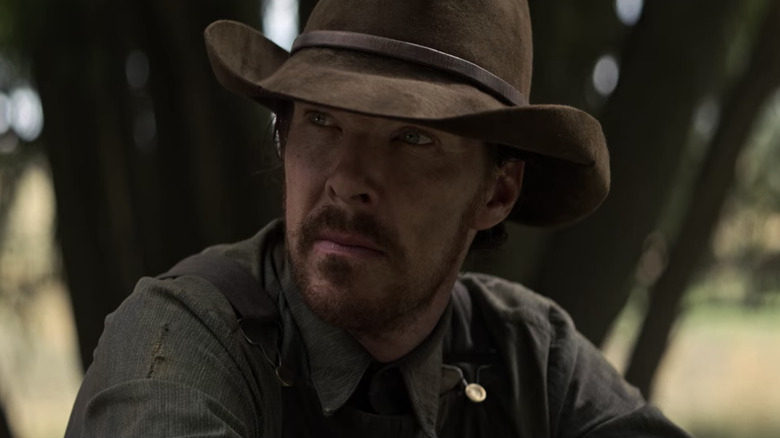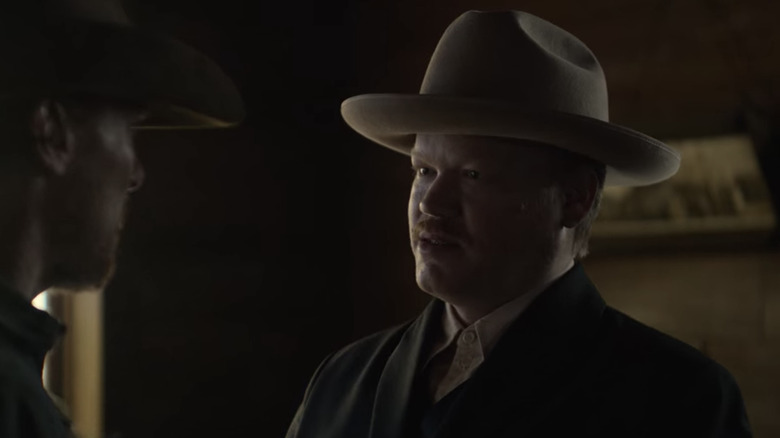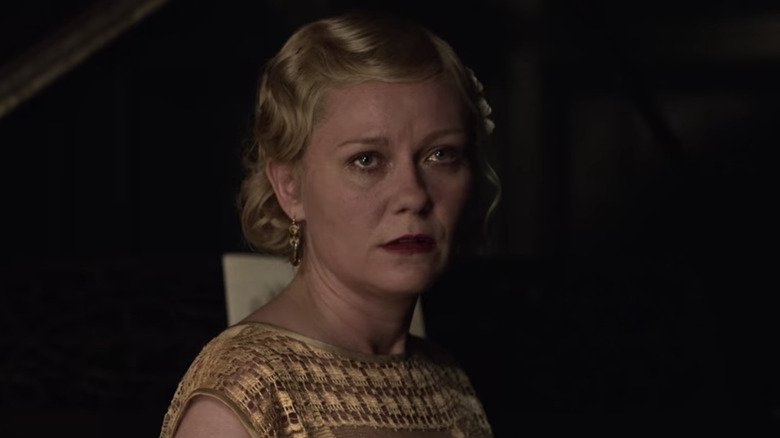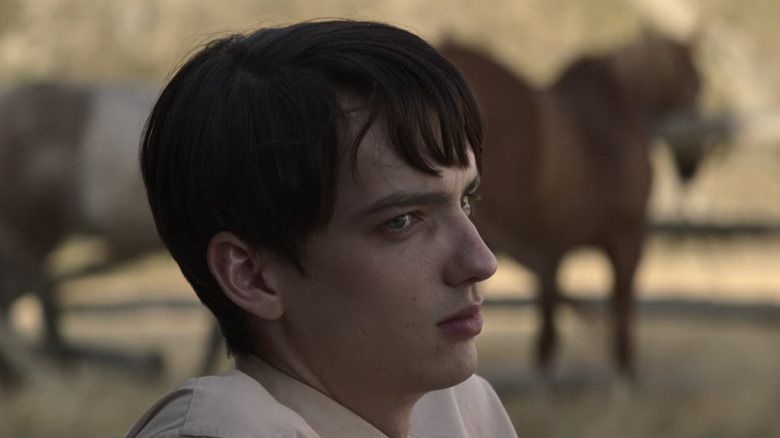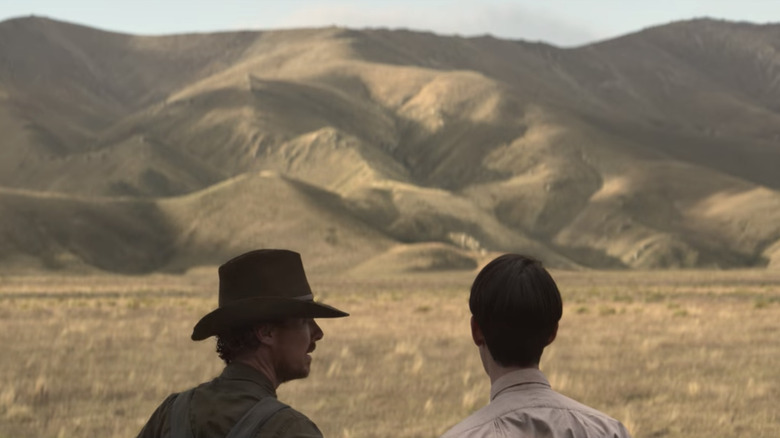The Power Of The Dog Ending Explained: Deliver My Soul From The Sword And My Darling From Benedict Cumberbatch
"The Power of the Dog," now streaming on Netflix, lures the viewer in with a magnetic Benedict Cumberbatch performance, yet it's significant that the film opens with a voiceover from Kodi Smit-McPhee's character, Peter Gordon. He says, "When my father passed, I wanted nothing more than my mother's happiness. For what kind of man would I be if I did not help my mother? If I did not save her?"
That line informs the subtle shadings of what happens in "The Power of the Dog," and it will come back into play in a big way at the end of the movie. Kirsten Dunst plays Peter's mother, Rose Gordon, and Dunst's real-life husband and "Fargo" season 2 co-star, Jesse Plemons, plays her suitor, George Burbank, the beleaguered brother of Cumberbatch's domineering Phil Burbank.
It's Phil, initially, who is the focus of the film, with these other three characters anchoring "The Power of the Dog" as an enthralling character study of the troubled Montana rancher and his oppressive effect on those around him. The film's period setting, combined with its central struggle between an older and younger man and its atmospheric Johnny Greenwood score, have drawn comparisons to Paul Thomas Anderson's "There Will Be Blood." That movie played out from 1898 to 1927, while "The Power of the Dog" is set in 1925.
It's a credit to writer-director Jane Campion that she is able to depict her characters' inner lives without falling back on voiceover again after that opening scene. "The Power of the Dog" prefers to show and not tell, trusting its audience to pick up on the clues it leaves along the way. By the end, we can suss out what happened even if the movie does not come right out and say it.
The Unwashed, Unloved Cowboy
When we first meet Phil and George, you can feel the tension in their relationship and see how George holds Phil at a distance. Phil is always calling George "Fatso," and he wastes his breath recalling the glory days of his dead mentor, Bronco Henry. George never seems interested or at ease around his brother. Phil has to remind him that it's the 25th anniversary of their inaugural cattle run, but to George, the occasion isn't worth celebrating. He doesn't even want to share a drink with Phil.
Though Phil can be abrasive and he puts up a hardened front around his cowboy crew, you almost feel sorry for him at first, because Campion puts us in his perspective and allows us to know his experience. "The Power of the Dog" is a film that might be said to fit the revisionist Western label; it calls into question the genre's classic cowboy-tough depictions.
Phil is like an overgrown Lost Boy. He even refuses to take a bath. Yet his unwashed, hyper-masculine veneer masks a vulnerable side, and in his relationship with George, it's clear that he's the needier one, acting out at times because it's so one-sided and he gets no love in return.
At dinner, Peter and Rose wait on Phil, George, and their men, and Peter quickly becomes the object of Phil's derision. He bullies him and even burns one of the paper flowers that Peter has painstakingly crafted and used to decorate the table.
Rose comes to collect all the other flowers before he can do any more damage. Eventually, Peter storms out the backdoor of the restaurant, venting his stress by hula-hooping, of all things, while Rose is left crying inside, where George tries to comfort her.
The Emotional Terrorist
"The Power of the Dog" is split into five chapters with Roman numerals. In the second chapter, George begins courting Rose, and at the end of that chapter, he drops the bombshell on Phil that he has married Rose in secret. A key insight that "The Power of the Dog" offers into George comes a few scenes later when he and Rose are driving back from Peter's college. They stop off on the side of the road for a picnic, and she gives him a dance lesson before he breaks away and sheds a tear. "I just wanted to say how nice it is not to be alone," he says.
Though he shares a house (and a bed) with his brother, George has kept himself walled off emotionally. Phil, meanwhile, is an emotional terrorist, a frontier fount of toxic masculinity, whose spasms of verbal and mental abuse stem from his own insecurity and craving for companionship. We've heard him disparaging Rose, saying she's after George's money, and when George brings his new wife — Phil's sister-in-law — back to their house, Phil is not at all welcoming. "I'm not your brother," he tells Rose. "You're a cheap schemer."
In point of fact, Phil is jealous of her. One of the ways he terrorizes her is by putting pressure on her about her piano-playing. George has invited their parents and the governor and his wife for dinner, and he wants Rose, who used to play piano in a cinema pit, to entertain their guests. Rose is out of practice and does not feel ready, but she tries to prepare behind closed doors, only to have Phil taunt her by playing the same tune on his banjo better than she can play it on the piano.
Peter's Inner Strength
When Peter comes back from medical school, he finds that his mother has become an alcoholic wreck and lives under the constant cloud of Phil. Campion begins weaving in more homoerotic overtones and it soon becomes clear that Phil has repressed his own sexuality in favor of being a man's man among other cowboys. He eyes the other men as they are skinny-dipping, but he has a secret place he goes to where he swims naked on his own and keeps a stash of magazines showing the male physique.
At the house, we get a hint that there is more to Peter than meets the eye when we see him casually dissecting a cute rabbit that he had used to comfort Rose. Phil and his men call Peter names like "Nancy Boy" and "Little Lord Fauntleroy" because of his outwardly effeminate, sensitive nature, but that is nothing compared to what Peter went through when he had to deal with his father's suicide.
Unlike Phil, Peter has formed his own inner strength without needing to project a false front. He is open about who he is, which may be why Phil has a change of heart and tries to befriend him, saying they got off on the wrong foot.
There's a part of Phil that envies Peter. He sees how Peter endures the slings and barbs and f-slurs of the other cowboys, and he sees a chance with Peter to recapture some of his lost relationship with Bronco Henry. Peter, conversely, witnesses how Phil is destroying his mom. There's a scene where Rose is drunk and unraveling in front of him, trying to mother him, and he says, "You don't have to do this. I'll see you don't have to do it."
After finding Phil's magazine stash, Peter gains insight into who he is and devises a way of freeing his mother from Phil's reign of emotional terror. Having learned that cows on the ranch die of anthrax, Peter finds one such cow and retrieves its hide.
The Darling and the Dog
When Peter and Phil are out together one day, Phil (who never wears gloves) also cuts his hand while trying to flush a rabbit out of its hiding spot. Phil is making a lasso out of rawhide, and after Rose angers him by giving all his hides to Indigenous traders, Peter quells his rage by offering the one he retrieved.
Using his knowledge of Bronco Henry and Phil's sexuality to his advantage, Peter manipulates Phil in the barn at night and gets him to unknowingly expose himself to anthrax through the open wound on his hand. Phil takes ill in bed overnight, and in the morning, he leaves the lasso for Peter before George drives him to the hospital.
The next thing you know, Phil is dead in a coffin. The meaning of the film's title crystallizes when we hear Peter quoting a line of scripture from Phil's burial. "Deliver my soul from the sword; my darling from the power of the dog."
Here, Rose is the darling and Phil is the dog. Peter did what he deemed necessary to liberate his mother from Phil's noxious influence.
In his room, we see Peter handling Phil's anthrax lasso — with gloves — and he slides it under his bed and goes to the window, where he sees Rose and George embracing. They are now emancipated from Phil, and for Peter, the dog is neutered, which is why he smiles, even as the movie ends on a dark twist and the viewer's brain races to catch up. Campion leaves the twist understated, but it's heavily implied that Peter acted to cause Phil's death.
You know you're in good hands with Campion; she's the director and Oscar-winning screenwriter of "The Piano," and though she's been away from movies for over a decade, focusing on TV projects like "Top of the Lake," she's lost none of her cinematic touch. "The Power of the Dog" is a mesmerizing tale that asks the viewer to see the hidden shape in it, much like Phil and Peter see the shadow of a barking dog in the mountains. We've said it before and we'll say it again: it's one of the best films of 2021.
